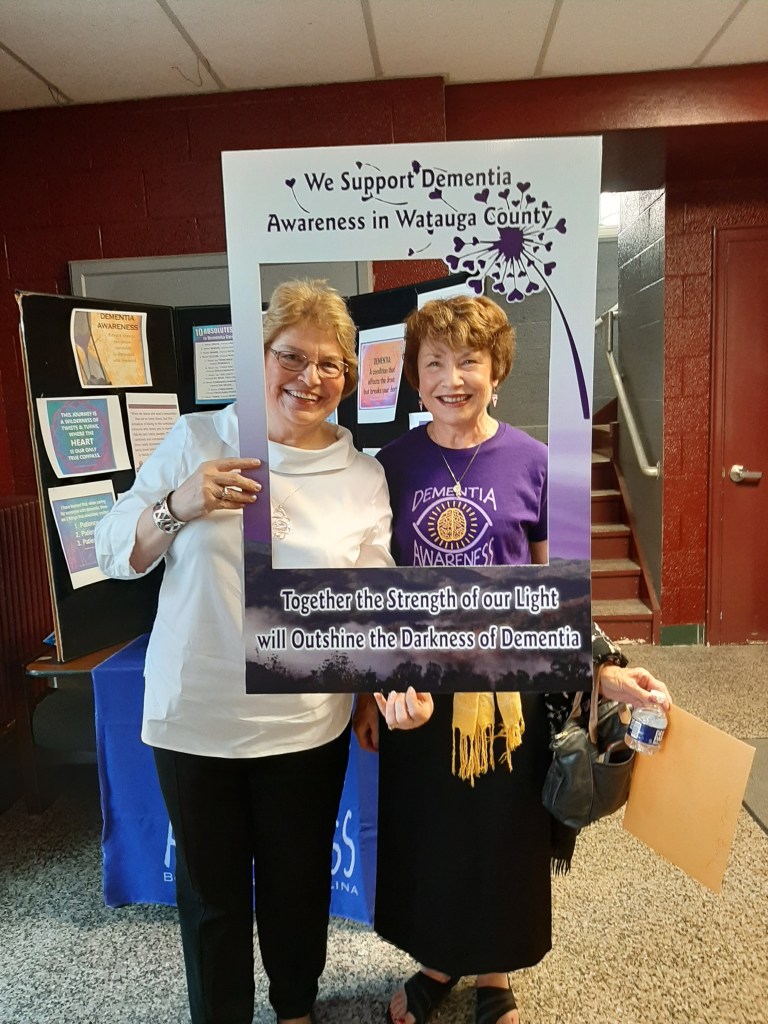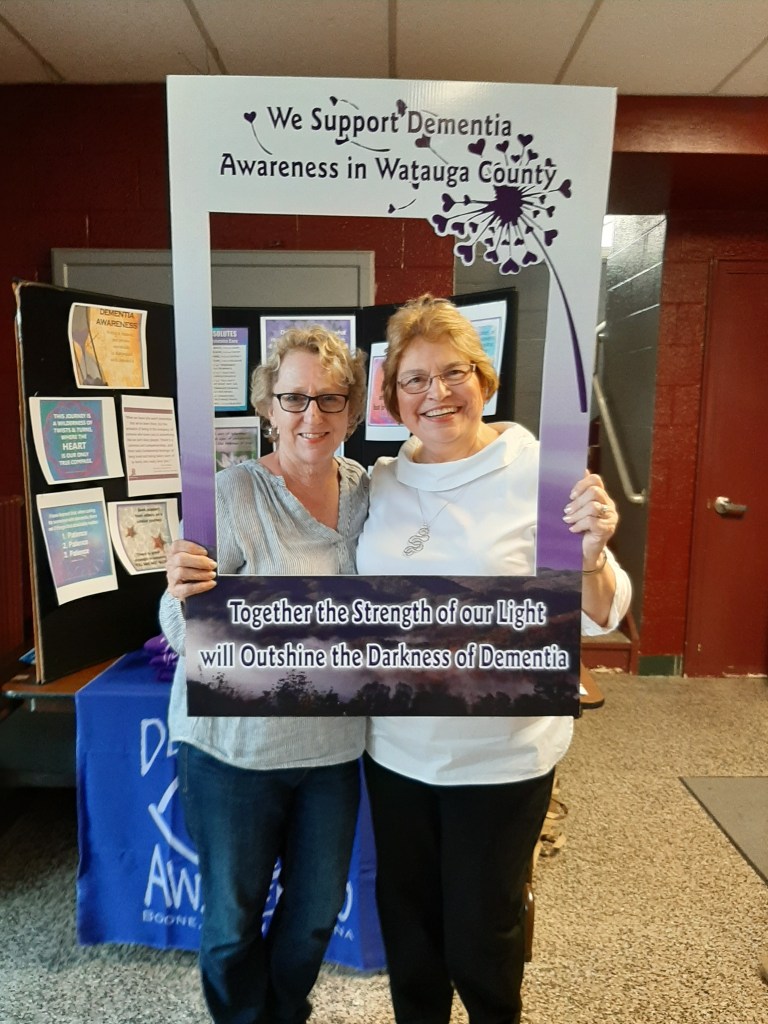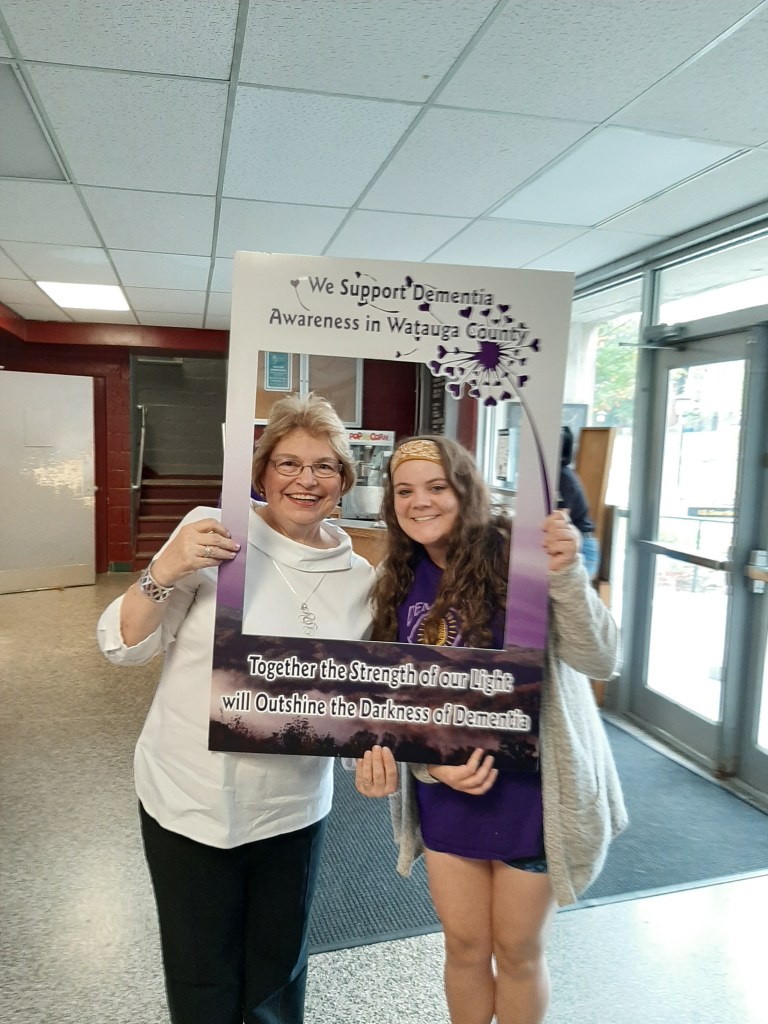“Yes, I have Alzheimer’s disease and I am living with it, not dying with it,” offers Pam McElreath of Sugar Grove, North Carolina. “My involvement with the Alzheimer’s Association during the past three years has given me the strength to share my story. I believe it is important for me to be seen and for people to better understand firsthand what I am going through.” Pam, as well as many of her peers who are living with dementia, has experienced situations where they were made to feel worse than they actually were by their doctors and/or medical teams. “I’m an advocate for better doctor/patient relationships in getting this diagnosis,” asserts Pam. “Doctors not only need to be better informed but have a little heart when they do tell people.” Recently appointed to the Alzheimer’s Association National Early-Stage Advisory Group, Pam is helping bring the voice of individuals living with dementia to the national forefront.

At age 56, Pam was initially diagnosed in 2011 with mild cognitive impairment, which causes a slight but noticeable and measurable decline in cognitive abilities, including memory and thinking skills. A few year’s later, she was diagnosed with younger-onset Alzheimer’s, which refers to those living with the disease who are younger than 65 years of age. “At that time, the medical team told us to do those devastating things like go get your wills done, you have a short period of time.” Pam had always managed the banking and financial work for both their home and insurance business for well over 20 years. “They told us that I should give up all financial responsibilities. It was devastating to have everything that you did both at home and at work gone within just a couple weeks.” Pam did not feel like her condition was that bad, yet she could not get any answers. She did have an MRI that showed a little change; however, it was not until they moved from the Sandhills area of North Carolina to the mountains to be closer to their children’s families that Pam and Jimmy learned more about her condition. After moving, they went to Winston–Salem to sign up for a clinical trial. A PET scan determined that Pam not only had frontotemporal dementia (FTD) but also kidney cancer. The clinical trial consequently was no longer an option. “I remember meeting with the anesthesiologist in preparation for my [cancer] surgery,” continues Pam. “He asked me why I was taking certain medications, and I answered with my recent diagnosis of younger-onset Alzheimer’s. He rolled his little chair and started talking to my husband and totally ignored me. I lay there crying thinking that I had become invisible because of this diagnosis. What I said no longer mattered anymore. It was so heartbreaking.” After that experience, Pam and Jimmy talked and agreed that if that type of situation occurred in the future that he would speak up and say, “Ask her, and if she can’t answer, I will help her.”

Pam had to heal from the kidney cancer but did not believe her condition had worsened in living with Alzheimer’s disease. A visit to Duke University confirmed that she did have FTD, but in the early stages. “My cognitive abilities had gotten worse because of the cancer, so I’m not as bad as I first was, but I do have a deficit. The kidney cancer had made my condition much worse initially.” The doctor at Duke shared with Pam that every dementia patient is different. He explained to her, “When you see one, you haven’t seen them all. We are all different and there is really no easy way to diagnose Alzheimer’s disease.” While this conversation really helped Pam to better understand why the initial doctors did what they did (advising her husband to take everything away from her) she still firmly believes it was a terrible, really bad experience for her. “I should have been given a little more time in giving up things rather than all at once.”
Pam has had to make some adjustments in living with Alzheimer’s disease. “I have a notebook that I write everything down in to remind me. I have a calendar that Jimmy and I both write in daily as to what we are supposed to do that day, and I have a clock with the day, month, year and time on it that I highly recommend.” Pam adds that she still cooks as long as she does not leave the kitchen. “I’ve tried to explain that I go through my day similarly perhaps to how someone might struggle with an attention deficit.” She will begin a project, then notice something else that needs to be done. That same cycle continues and at the end of the day, nothing is completely finished. “With laundry, I would put it in to wash but never remove it to put it in the dryer. If I was cooking, I would leave the kitchen and whatever I was cooking would burn. I just had to learn that if I was going to do something, I had to stick to it and everything else would have to wait.” Organization and accepting the fact that multitasking is no longer a viable option are critical to Pam in her current daily life. “If it is important, I have to make myself finish it.”

Pam still drives a car but only to her daughter’s which is down the same street or somewhere local. She hardly ever drives to Boone anymore which is about 17 miles away. “I’ve not had any problems, but I want to give it up before it is taken away. “Having everything taken away from me like the checks and the credit card was so hard for me. My husband did give them back and I do write checks some times. I want to be able to give them up first.”
Pam believes her work through the Alzheimer’s Association gives her a purpose for living. “I could see these cancer survivors telling their stories, and I believe it’s the same way with us. We want to talk about what’s going on with us without people being afraid. We want them to understand that it’s hard, but I can still do things and I want to do things.” Pam admits that she was initially told not to tell anybody that she was living with Alzheimer’s for a while — that it would be much easier if she didn’t. “I thought to myself, ‘What other disease does the doctor tell you to not tell anybody?’ It was so bizarre. Cancer was treated similarly in the past. I remember my mother telling in a whisper that so and so had cancer. We’ve gotten over that and now we need to get over this [Alzheimer’s].”
By more people being diagnosed in the earlier stages of this disease, Pam believes more people will see that that the diagnosis itself is not the death sentence that it once was. “It helps me to be able to speak through my work with Western Carolina Chapter of the Alzheimer’s Association as well as this new advisory group.” Pam recently even wrote a guest blog in Everyday Health on how the pandemic gave her purpose while living with dementia. Participating in the local Walk To End Alzheimer’s events gives her hope as well. “I’m proud to be able to tell the stories and the mission behind our organization that supports a world without Alzheimer’s and all other dementia.”
If you have been diagnosed with Alzheimer’s or another dementia, you are not alone.
There are people who understand what you are going through, and help is available. There is much you can do to cope with the changes ahead. Learn More


Pam, as always you have explained your experience while also giving those of us with Alzhiemers and Dementia hope and our loved ones some guidance in dealing with our conditions. I hope, especially for the caregivers, they can take this information and address these diseases with an open mind, a willingness to do research, find your loved one a support group and join a support group yourself which is the most important thing you can do for yourself. You are not alone!
LikeLike
Thank you for all your help on this journey. Support Groups are so very important for caregivers and for us. I could not survive without my peer to peer group. It’s crucial that we support each other and speak out to educate the public.
LikeLike
Thank you for all your help on this journey. Support Groups are so very important for caregivers and for us. I could not survive without my peer to peer group. It’s crucial that we support each other and speak out to educate the public.
LikeLike
Pam, you look so good. Miss seeing you. I live you
Rosie Bentley
LikeLike